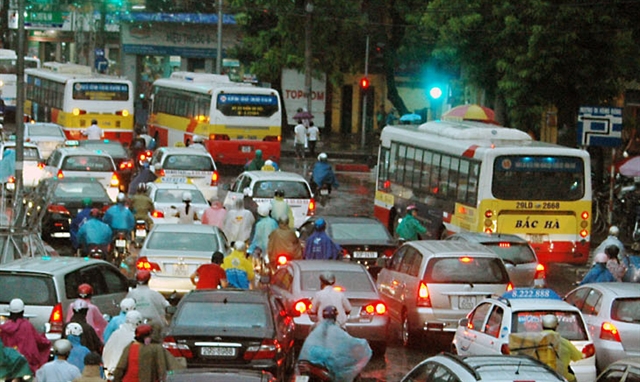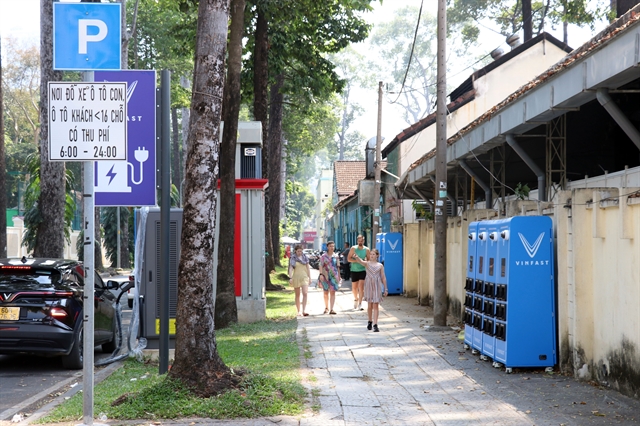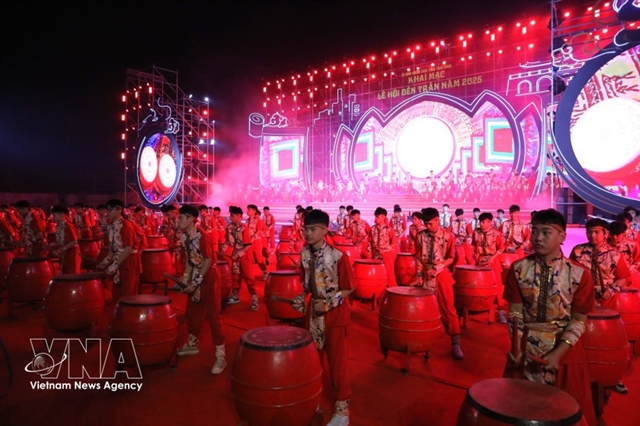 Society
Society


|
| Buses stuck in a traffic jam at the Cửa Nam crossroads in Hoàn Kiếm District, Hà Nội. — VNA/VNS Photo Tuấn Anh |
HÀ NỘI — The commute to or from downtown Hà Nội during rush hour can be stressful to say the least.
Unless of course you opt for a different mode of transport other than motorcycle or motorcar.
As vehicles jostle for space in and out of lanes, the most relaxing place for many commuters is sat on board a bus.
Once such passenger is Thuỳ Linh who has been a bus user in the capital for the past eight years.
Her journey sat by the window reading a book is stress free. She flicks the pages of the novel oblivious to the toots and honks on the streets she travels.
“Convenience is the first reason why I choose the bus as my main mode of transportation,” Linh told Việt Nam News. “Both my house and my workplace are near bus stops.”
But Linh’s choice of transportation isn’t for everyone.
According to Nguyễn Hoàng Hải, director of Hà Nội Urban Transport Management and Operation Centre (TRAMOC), only 12 per cent of residents use this form of public transport.
This is far from the goal set five years ago that aimed to have 20 per cent of the eight million commuters using buses.
One problem standing in the way is the amount of ride hailing services that have emerged in recent times.
Low prices to get from A to B are often too much of a temptation for the average commuter to pass up, more so when deals are offered reducing fares to next to rock bottom prices.
Infrastructure to better the bus journey is also an issue. Transit stations, better shelters and special lanes are a rare sight. And the lack of stops means potential passengers are reluctant to walk too far to catch the bus.
Speed is also a factor. As roads get more congested, bus journeys become longer, according Vietnam News Agency.
Hà Nội bus passenger growth in the first half of 2019 remained low, creeping up less than 1 per cent compared to the same period last year.
Plus more than half of all schedules bus services were delayed, in some cases by up to 20 minutes.
Those who do opt for public transport are often students and the elderly.
Pensioner Đinh Thị Hà from Linh Đàm Urban Area chooses buses over motorbikes. For her, No.106 bus is convenient and stops close by to the restaurant she works at.
“Buses on this route are clean, and attendants are helpful. It costs me only VNĐ100,000 (US$4.30) a month so I have switched to the public bus for two years,” she said.
But with a lack of a decent shelter, when it rains there can be problems.
“It is acceptable on sunny days yet on rainy days, we have nowhere to hide. Therefore, I think the bus company should set up a shelter here,” she said.
Sharing the opinion, Nguyễn Thị Hoàng Anh, student of University of Labour and Social Affairs, recognised efforts of operators in improving public transporting service.
“I have observed on the route No.60 connecting the National Hospital of Tropical Diseases No.2 with Nước Ngầm Station, drivers sometimes skip stops, especially during late rides,” said Anh.
“Although I have raised this several times, the situation has not improved.”
Passenger Thuỳ Linh has nothing but praise for the BRT and eco-friendly CNG-fueled vehicles.
“Drivers and attendants of these vehicles are much more patient with passengers, waiting for them to get on, get off safely before running,” she said.
Ngọc Hà, a white-collar worker in Hai Bà Trưng District, said the smartphone-based app “Tìm buýt” (Searching for a bus) helped her to save time.
“However, it can only track buses operated by Transcerco. If it can include data of other operators, the app is much convenient,” she said
Travelling time is the key factor in choosing means of transportation, especially to people in working age, according to Nguyễn Ngọc Quang, lecturer of University of Transport.
“To increase its market share, public buses first need to ensure punctuality and travelling time to compete with motorbikes,” he said.
But he admits more needs to be done to improve awareness and encourage people to swap their motorbikes for the bus which in the long term will improve air quality and reduce conjestion.
This year, Hà Nội plans to launch four new bus routes using compressed natural gas vehicles to help protect the environment. A new, high quality route connecting Hà Đông City and Nội Bài International Airport was opened in June. — VNS




